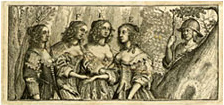Thomas Harriot, A Brief and True Report of the New Found Land of Virginia (1588)
Full Text
EEBO/TCP
Not available
Date
1588
Author
Thomas Harriot Note: 30/09/2005
Book title
A briefe and true report of the new found land of Virginia: of the commodities there found and to be raysed, as well marchantable, as other for victuall, building and other necessarie vses for those that are and shalbe the planters there; and of the nature and manners of the naturall inhabitants: Discouered by the English Colony there seated by Sir Richard Greinuile Knight in the yeere 1585. which remained vnder the gouernment of Rafe Lane Esquier, one of her Maiesties Equieres, during the space of twelue monethes: at the speciall charge and direction of the Honourable Sir Walter Raleigh Knight, Lord Warden of the stanneries; who therein hath beene fauored and authorised by her Maiestie and her letters patents: Directed to the Aduenturers, Fauourers, and Welwillers of the action, for the inhabiting and planting there: By Thomas Hariot; seruant to the abouenamed Sir Walter, a member of the Colony, and there imployed in discouering
Publication place
London
Publisher
R. Robinson
Transcription source
Henry E. Huntington Library copy
Text type
printed book
Genre
Bilingual and polyglot dictionaries, glossaries, and vocabularies
Subject area
- agriculture
- Algonkian
- fauna
- fishing
- minerals
- travel
Summary
"The first part of Marchantable commodities" (b1r-b4v) gives paragraph-length descriptions of resources such as grass silk, worm silk, flax and hemp, allum, wapeih, pitch, tar, rosin, turpentine, and sassafras. "The second part" (c1r-d3v) and "The third and last part" (d4r-e1v) cover largely native goods such as pagatowr and okindgier and so explains the meaning of Algonkian words.
Language
headwords: English and Algonkian
explanations: English and Algonkian
explanations: English and Algonkian
explanations: English and Algonkian
explanations: English and Algonkian
Word-group
type: topical
number: 10
number: 10
Word-entry
type: logical
sample: There is an herbe which is sowed a part by it selfe & is called by the inhabitants vppówoc: In the West Indies it hath diuers names, according to the seuerall places & countries where it groweth and is vsed: The Spaniardes generally call it Tobacco. The leaues thereof being dried and brought into powder: they vse to take the fume or smoke thereof by sucking it through pipes made of claie into their stomacke and heade; from whence it purgeth superfluous fleame & other grosse humors, openeth all the pores & passages of the body: by which meanes the vse thereof, not only preserueth the body from obstructi ons; but also if any be, so that they haue not beene of too long continuance, in short time breaketh them: wherby their bodies are notably preserued in health, & know not many greeuous diseases wherewithall wee in England are oftentimes afflicted.
sample: There is an herbe which is sowed a part by it selfe & is called by the inhabitants vppówoc: In the West Indies it hath diuers names, according to the seuerall places & countries where it groweth and is vsed: The Spaniardes generally call it Tobacco. The leaues thereof being dried and brought into powder: they vse to take the fume or smoke thereof by sucking it through pipes made of claie into their stomacke and heade; from whence it purgeth superfluous fleame & other grosse humors, openeth all the pores & passages of the body: by which meanes the vse thereof, not only preserueth the body from obstructi ons; but also if any be, so that they haue not beene of too long continuance, in short time breaketh them: wherby their bodies are notably preserued in health, & know not many greeuous diseases wherewithall wee in England are oftentimes afflicted.
STC
12785
Other editions
1590: STC 12786;
1589, 1600: in Hakluyt see LEME # 228 (? title not in ESTC);
1602: Brereton "A briefe extract of the merchantable commodities found in the South part of Virginia, ann. 1585 .... Gathered out of the learned worke of master Thomas Herriot" (see Quinn and Quinn [1983]: 143-203)
1589, 1600: in Hakluyt see LEME # 228 (? title not in ESTC);
1602: Brereton "A briefe extract of the merchantable commodities found in the South part of Virginia, ann. 1585 .... Gathered out of the learned worke of master Thomas Herriot" (see Quinn and Quinn [1983]: 143-203)
Facsimiles
Hariot, Thomas. A Brief and True Report of the New Found Land of Virginia. A Facsimile Edition of the 1588 Quarto. New York: The History Book Club, Inc., 1951. view record
Hariot, Thomas. A Brief and True Report of the New Found Land of Virginia (1588) . Ed. Thomas Royster. Electronic Texts in American Studies 20 . University of Nebraska - Lincoln: Digital Commons , 2007. view record
Hariot, Thomas. A Brief and True Report of the New Found Land of Virginia (1588) . Ed. Thomas Royster. Electronic Texts in American Studies 20 . University of Nebraska - Lincoln: Digital Commons , 2007. view record
Criticisms
Salmon, Vivian. "Thomas Harriot (1560-1621) and the English Origins of Algonkian Linguistics." Historiographia Linguistica 19.1 (1992): 25-56. view record
Quinn, David B. The Roanoke Voyages, 1584-1590: Documents to Illustrate the English Voyages to North America under the Patent Granted to Walter Raleigh in 1584. 2 vols. London: Hakluyt Society, 1955. appendix. view record
Quinn, David B. The Roanoke Voyages, 1584-1590: Documents to Illustrate the English Voyages to North America under the Patent Granted to Walter Raleigh in 1584. 2 vols. London: Hakluyt Society, 1955. appendix. view record




